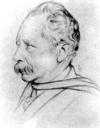- Bateson, William
-
born Aug. 8, 1861, Whitby, Yorkshire, Eng.died Feb. 8, 1926, LondonBritish biologist.In 1900, while studying inheritance of traits, he was drawn to the research of Gregor Mendel, which explained perfectly the results of his own plant experiments. He was the first to translate Mendel's major work into English. With Reginald Crundall Punnett, he published the results of a series of breeding experiments that not only extended Mendel's principles to animals but also showed that, contrary to Mendel, certain features were consistently inherited together, a phenomenon that came to be termed linkage (see linkage group). In 1908 he became Britain's first professor of genetics, and in 1909 he introduced the term genetics. He opposed Thomas Hunt Morgan's theory of chromosomes. Gregory Bateson was his son. See also Carl Erich Correns; Hugo de Vries; Erich Tschermak von Seysenegg.
 William Bateson, drawing by Sir William Rothenstein, 1917; in the National Portrait Gallery, LondonBy courtesy of the National Portrait Gallery, London
William Bateson, drawing by Sir William Rothenstein, 1917; in the National Portrait Gallery, LondonBy courtesy of the National Portrait Gallery, London* * *
▪ British biologistborn August 8, 1861, Whitby, Yorkshire, Englanddied February 8, 1926, Londonbiologist who founded and named the science of genetics and whose experiments provided evidence basic to the modern understanding of heredity. A dedicated evolutionist, he cited embryo studies to support his contention in 1885 that chordates evolved from primitive echinoderms, a view now widely accepted. In 1894 he published his conclusion (Materials for the Study of Variation) that evolution could not occur through a continuous variation of species, since distinct features often appeared or disappeared suddenly in plants and animals. Realizing that discontinuous variation could be understood only after something was known about the inheritance of traits, Bateson began work on the experimental breeding of plants and animals.In 1900, he discovered an article, “Experiments with Plant Hybrids,” written by Gregor Mendel (Mendel, Gregor), an Austrian monk, 34 years earlier. The paper, found in the same year by Hugo de Vries, Carl Correns, and Erich Tschermak von Seysenegg, dealt with the appearance of certain features in successive generations of garden peas. Bateson noted that his breeding results were explained perfectly by Mendel's paper and that the monk had succinctly described the transmission of elements governing heritable traits in his plants.Bateson translated Mendel's paper into English and during the next 10 years became Mendel's champion in England, corroborating his principles experimentally. He published, with Reginald Punnett (Punnett, Reginald Crundall), the results of a series of breeding experiments (1905–08) that not only extended Mendel's principles to animals (poultry) but showed also that certain features were consistently inherited together, apparently counter to Mendel's findings. This phenomenon, which came to be termed linkage (linkage group), is now known to be the result of the occurrence of genes located in close proximity on the same chromosome. Bateson's experiments also demonstrated a dependence of certain characters on two or more genes. Unfortunately, he misinterpreted his results, refusing to accept the interpretation of linkage advanced by the geneticist Thomas Hunt Morgan. In fact, he opposed Morgan's entire chromosome theory, advocating his own vibratory theory of inheritance, founded on laws of force and motion, a concept that found little acceptance among other scientists.Bateson became, at the University of Cambridge, the first British professor of genetics (1908). He left this chair in 1910 to spend the rest of his life directing the John Innes Horticultural Institution at Merton, South London (later moved to Norwich), transforming it into a centre for genetic research. His books include Mendel's Principles of Heredity (1902, 2nd edition published in 1909) and Problems of Genetics (1913).* * *
Universalium. 2010.
